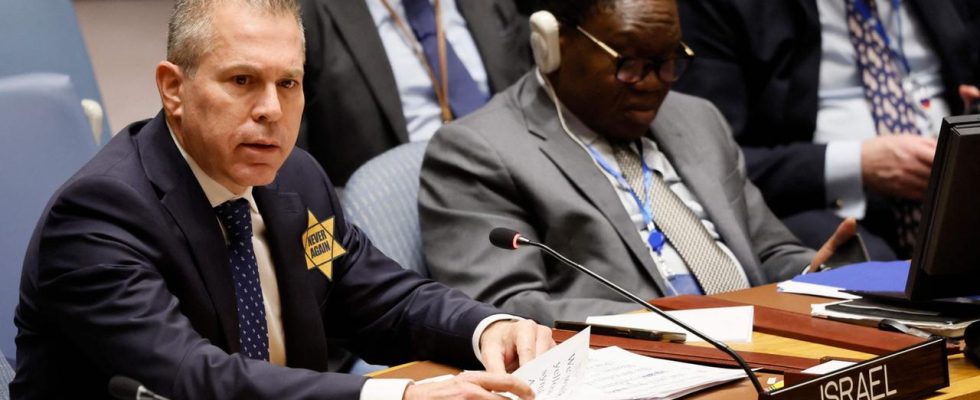The situation in the Middle East has been one of the most controversial issues at the United Nations for decades. The relationship between Israel and the UN is considered difficult – and has now reached a low point.
“From this day forward, every time you look at me, I will remind you what it means to remain silent in the face of evil” – when Israel’s UN Ambassador Gilad Erdan said this in the UN Security Council on Monday, he pinned himself a yellow card Star of David on the chest. “Never again” was written on it in English.
Erdan explained that his entire team was wearing the Holocaust symbol – just as the grandparents of millions of Jews had worn it. “We will wear this star until you condemn Hamas’ atrocities and demand the immediate release of our hostages,” he added.
No unified condemnation of Hamas terror
In fact, the most powerful UN body was once again unable to unanimously condemn Hamas’ bloody deeds. UN chief António Guterres, however, had done this in the Security Council days earlier. But the Secretary General also spoke of Israel’s 56-year-long “oppressive occupation” of the Palestinians: “It is important to recognize that Hamas’ attacks did not take place in a vacuum.” Israel’s ambassador angrily demanded the resignation of the top UN diplomat.
It is the low point of an already difficult relationship between Israel and the United Nations, says UN observer Richard Gowan from the Crisis Group think tank: “Almost since the UN was founded in the 1940s, the situation in the Middle East has been one of the hottest topics through all committees.”
U.N-general assembly is considered Obstetrician Israel
Israel feels treated unfairly by the UN and complains about an “automatic critical majority” against it. In fact, between 2015 and last year, the UN General Assembly passed 140 resolutions that were critical of Israel – for example on settlement construction or the occupation of the Golan Heights. All other countries were subject to resolutions just 68 times during the same period.
The UN General Assembly is also seen as Israel’s midwife. Mainly with the votes of the Western states, but also the Soviet Union, the General Assembly voted in 1947 to divide Palestine into a Jewish and an Arab state. Countries such as Egypt, Lebanon, Saudi Arabia and Turkey voted against it.
Six months later, the State of Israel was founded. Anger grew in the Muslim states and tensions grew at the UN, says David Makovsky, Middle East expert at the Israel-friendly think tank Washington Institute: “Israel always had the feeling that there were double standards. That the Arab states, because of their composition “We would be quick to condemn Israel without understanding Israel’s legitimate security concerns. That’s why there’s this tension – sometimes even outright hostility – between Israel and the United Nations.” Israel has the feeling “that it is a set-up and that it has no chance,” said Makovsky.
“They cooperate under the table”
The anti-Israel coalition grew from 1967 – especially after the occupation of the Palestinian territories, East Jerusalem, the Golan Heights and the Sinai Peninsula. Israel later withdrew again as part of the peace settlement with Egypt. But in the international community the fronts against the country hardened. Even in the global South and the Eastern Bloc of the Cold War, Makovsky says: “There are the two veto powers, the Soviets and China. And then the developing countries that see Israel as a Western colonial power.”
Relations reached an all-time low in 1975: the General Assembly designated Zionism as a form of racism. The resolution was repealed in 1991. But it continued to exist in the minds of many countries.
Middle East expert Makovsky speaks of a divided reality in the United Nations. Even Arab states like Morocco or Jordan, which have also cooperated with Israel, would not show it openly on this stage: “They cooperate under the table, but on stage they play theater in front of their allies. Turkey is also one of them.” There is a long list of countries that have good relations with Israel but do not want to admit it, says Makovsky. “Publicly, they vote against Israel. One hundred percent. No question.”
“Israel has an advantage in the most powerful body”
It is an attitude that even a UN Secretary General cannot influence. Although Guterres is considered to be friendly to Israel, as UN expert Gowan says. He thinks Israel’s diplomats are venting their general anger at the secretary general because of international criticism of their actions.
The UN simply reflected the image of the global community: “The situation is that the Palestinians have a political advantage in many parts of the UN. But in the most powerful body, the Security Council, Israel has a decided advantage,” says Gowan. Because nothing changes there: the protecting power, the USA, uses its right of veto to ward off any unwelcome resolution against Israel.
But Washington also constantly warns Israel to uphold international martial law despite its claim to self-defense. There is also a fear behind this: even more images of destruction from the Gaza Strip could turn the Muslim world even more against Israel – and the conflict could spread.

